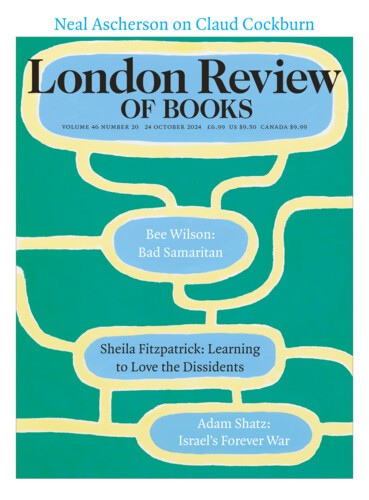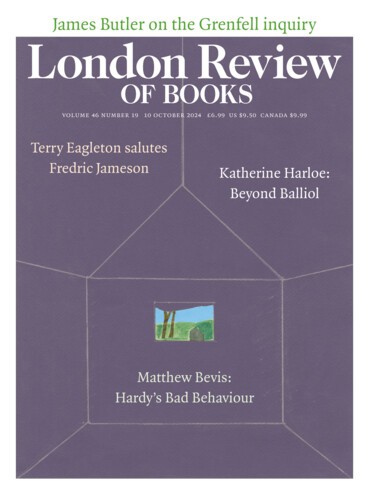There’s nothing surprising about Trump’s attack on the universities, or on the liberal law firms that he also despises. What is shocking is the ease with which his attack has so far succeeded. Like the academics and politicians in Michel Houellebecq’s novel Submission, American college administrators and lawyers are responding to Trump’s bullying as if it were an opportunity to carry out ‘reforms’ – and as if they were secretly relieved that their hand has been forced by the Leader. This is a tale not so much of capitulation to an authoritarian leader as of collusion with him.
Adam Shatz
Adam Shatz is the LRB’s US editor. He is the author of Writers and Missionaries: Essays on the Radical Imagination, which includes many pieces from the paper, and The Rebel’s Clinic: The Revolutionary Lives of Frantz Fanon. He has written for the LRB on subjects including the war in Gaza, Fanon, France’s war in Algeria, mass incarceration in America and Deleuze and Guattari. His LRB podcast series, Human Conditions, considers revolutionary thought in the 20th century through conversations with Judith Butler, Pankaj Mishra and Brent Hayes Edwards. Sign up here.
Wash out your ears: Messiaen’s Ecstasies
Adam Shatz, 20 February 2025
In March 1945, the classical music world in Paris split into warring camps after the premiere of Olivier Messiaen’s two-hour devotional suite for solo piano, Vingt Regards sur l’enfant-Jésus. The performer was Yvonne Loriod, a young pianist who would later become Messiaen’s wife. Reciting texts infused with Catholic mysticism after each movement, Messiaen struck the...
After Nasrallah: Israel’s Forever War
Adam Shatz, 24 October 2024
Hassan Nasrallah’s death was announced on Saturday, 28 September, the anniversary of the death of the Egyptian president Gamal Abdel Nasser, the father of Pan-Arabism. Nasser died of a heart attack in 1970, three years after his humiliating defeat in the Six-Day War, the ‘naksah’ or setback that led to Israel’s conquest of the West Bank, East Jerusalem, the Gaza...
After Nasrallah
Adam Shatz, 10 October 2024
Hassan Nasrallah’s death was announced on Saturday, 28 September, the anniversary of the death of the Egyptian president Gamal Abdel Nasser, the father of Pan-Arabism. Nasser died of a heart attack in 1970, three years after his humiliating defeat in the Six-Day War, the ‘naksah’ or setback that led to Israel’s conquest of the West Bank, East Jerusalem, the Gaza Strip,...
What next? Is Netanyahu betting on a Hizbullah overreaction? Is he trying to open a second front and to drag the Iranians – and the Americans – into war? Are the attacks part of his effort to return Donald Trump to the White House, or is he simply trying to stay in power with a show of military force? The war in Gaza has made him more popular than ever, in spite of mass protests in favour of a ceasefire.
Podcasts & Videos
Israel's War of Opportunity
Adam Shatz, Narges Bajoghli and Robert Malley
Iran’s supreme leader recently claimed victory, simply by reason of survival, in the war launched by Israel on 13 June, and joined a week later by the United States. With the twelve-day conflict apparently...
After Assad
Loubna Mrie, Omar Dahi and Adam Shatz
Adam Shatz is joined by Loubna Mrie and Omar Dahi to discuss the fall of Bashar al-Assad in Syria and the future of the country.
Gaza, Before and After
Ghassan Abu-Sittah, Muhammad Shehada and Adam Shatz
Ghassan Abu-Sittah and Muhammad Shehada join Adam Shatz to describe what life was like in Gaza in the months and years leading up to the Hamas attack on Israel last October, and to discuss the experiences...
A New War in Lebanon
Mohamad Bazzi and Adam Shatz
In his third conversation looking at the crisis in the Middle East, Adam talks to Mohamad Bazzi about Israel’s expansion of its war into Lebanon and the recent assassinations of Yahya Sinwar and Hassan...
The End of Hamas?
Yezid Sayigh and Adam Shatz
In the second of three conversations about the crisis in the Middle East, recorded shortly before the death of Hamas leader Yahya Sinwar was reported, Yezid Sayigh talks to Adam Shatz about why he sees...
Inside Israel
Mairav Zonszein, Amjad Iraqi and Adam Shatz
In the first of three episodes on the crisis in the Middle East, Adam Shatz is joined by Mairav Zonszein and Amjad Iraqi to discuss the experiences of Israeli Jews and Palestinian citizens of Israel.
On Jean-Luc Godard
Claire Denis, J. Hoberman and Adam Shatz
Claire Denis and J. Hoberman join Adam Shatz to talk about the work and legacy of Jean-Luc Godard.
A History of Revolution
Enzo Traverso and Adam Shatz
Enzo Traverso talks to Adam Shatz about his new book on the history of revolutionary passions, images and ideas, from the rebellion of self-liberated slaves in Haiti in 1791 to Stalin’s top-down authoritarianism....
Great Replacement Theory
Adam Shatz, Sindre Bangstad and Reza Zia-Ebrahimi
Adam Shatz, the LRB’s US editor, talks to Sindre Bangstad and Reza Zia-Ebrahimi about the Great Replacement conspiracy theory, from its origins in the high tide of French colonial expansionism in the...
Catholics and Lumpen-billionaires
Mike Davis and Adam Shatz
Adam Shatz talks to Mike Davis about some of the underlying and long-term political shifts at play in next week’s US elections.
Pieces about Adam Shatz in the LRB
Knife at the Throat: Fanon’s Contradictions
T.J. Clark, 26 September 2024
Fanon’s world has a logic. His pages are full of identities, contradictions, Aufhebungen – master and slave, being and nothingness. Any biography, however, has to decide in the end which of the various...
Read anywhere with the London Review of Books app, available now from the App Store for Apple devices, Google Play for Android devices and Amazon for your Kindle Fire.
Sign up to our newsletter
For highlights from the latest issue, our archive and the blog, as well as news, events and exclusive promotions.




